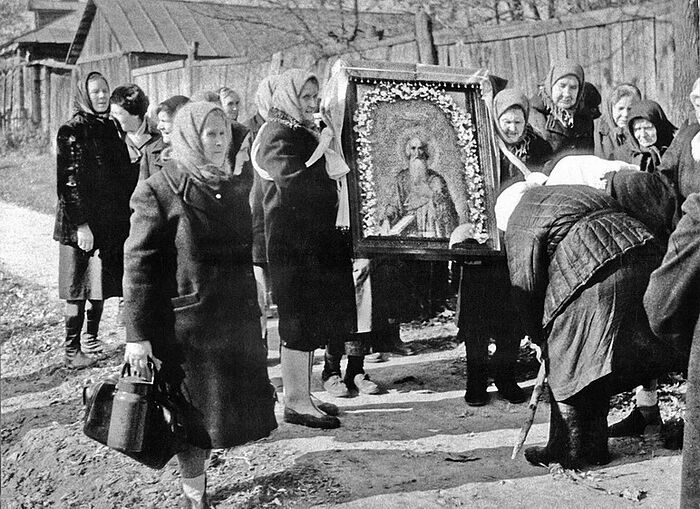FIRMNESS AND FAITH. STORIES OF NEW MARTYRS AMONG THE LAITY

The Church is filled with the fragrance of the saints. There are the Apostles—the affirmation of the Truth; they are followed by their disciples—the apostolic fathers. Further the holy fathers, the holy hierarchs, the martyrs, the monastic fathers and mothers, the fighteous and the “fools-for-Christ”. Each image has its own beauty, its own unique fragrance. Every saint breathes the grace of the Holy Spirit.
Let’s take the laymen. They are men and women, burdened with the cares of life, but with fiery hearts. They spend their whole lives marked by the memory of God. They are engaged in a constant struggle to live with God. One of our contemporaries once said: “I feel as though there is ‘me’, and there is ‘God’, somewhere separate from me.” This is what the saints of God feared most of all. Take the example of the New Martyrs.
Religious peasant collective farmers were forced to work not only on the Twelve Great Feasts that fell on weekdays, but also every Sunday. Their refusal to work on Sunday became at that time their confession of faith. There were forms of economic pressure for those who for religious reasons did not want to be held captive by the atheists—the farms of such peasants were subjected to exorbitant taxes and then seized due to debts. Thus, one Orthodox peasant was sentenced to exile. The inhabitants of two villages came to see him off. All those gathered prayed and wept, and when it was time to say goodbye, he told the fellow villagers: “Do not cry, brethren. We will not endure for a long time. The hour will come and we will rejoice, but now we need to endure and stand up for our cause without giving in to godlessness.”
The New Martyr Theoctista Chentsova (1880–1942; commemorated November 10) was arrested by the authorities as an active believer and charged with counter-revolutionary activities: “The investigators have precise information that you have furnished your apartment with icons and now arrange secret prayer meetings. Do you plead guilty to this?” Of course, the religious woman could not plead guilty to believing in God and confessing Him.
You cannot separate yourself from God. The martyrs encouraged those who were weak in faith to stand for the truth. The administration of the teacher’s training college in Kaluga where the New Martyr Anna Ostroglazova (1900-after 1937; feast: November 10) worked as an accountant gave the following description to the Joint State Political Directorate (OGPU): “There was a confirmed case when Ostroglazova persuaded a cleaner during an all-Union census to tick the ‘believer’ box.”
Of course, martyrdom is inextricably linked with the confession of faith. The expression of faith in action is a prerequisite for salvation. The New Martyr Stephen Nalivaiko (1898-1945; commemorated January 30) from Kherson province endured several exiles and labor camps. Having survived this, he made incredible efforts to open a church in the 1930s. Factory workers and the spiritual children of the Hieromartyr Peter (Zverev), Archbishop of Voronezh (1878–1929; commemorated January 24 and June 4), having learned about Vladyka’s arrest, staged a three-day strike.
The martyrs’ deeds breathe the simplicity and the spirit of the self-sacrificing love of early Christians. As evidence of a crime, the authorities searched for a Bible and a Gospel in a church reader’s home. Seventy-year-old Timofei Karasev told his wife during his arrest to feed the Cheka [the Extraordinary Commission for Combating Counter-Revolution, Sabotage and Speculation.—Trans.] officers. When a churchwarden—a religious woman—was ordered to hand over the keys to the because: “We need a place to store grain”, she answered: “I won’t give you the keys. Take my house, break the stove and fill it up with grain, but I won’t give you the keys.” The New Martyr Sergei Tikhomirov (1865–1922; feast: May 13) kept a butcher’s shop near his church. At the first strike of the alarm bell he was one of the first to rush to defend the church relics. At the trial he held himself courageously, did not ask for mercy, and refused a last word.
The Savior’s words come back to our memory: But when they deliver you up, take no thought how or what ye shall speak: for it shall be given you in that same hour what ye shall speak (Mt. 10:19). There was the following dialogue between a security agent and a novice nun:
“Listen carefully, grandma. You’ve been sentenced to twenty-five years. You won’t get out of here alive.” She calmly replied, “Well, but God is there too.”
This is not book wisdom. This is tears and prayers; this is the breath of the Spirit. Let’s travel back to the all-Union elections of 1937, the beginning of the harshest persecution. During the vote the New Martyr John Chernov (1880–1939; commemorated March 28) dropped a letter into the ballot box along with the ballot. He requested the opening of a church: “Good afternoon, our highly respected helper and mediator of the people Mikhail Petrovich... On behalf of the believers in God and the Holy Church we ask you to help us, old men and old women. Allow us to pray to God for the whole world and for you so that we under your leadership can live quiet, peaceful lives and go to church, where we feel joy of the heart, to pray to God. We rejoice for the Constitution, in which Article 124 speaks of freedom of worship. This is what we value most of all. While young people need to have fun and sing songs, we, elderly people need to go to God’s church to take Communion and sing the funeral service for the deceased. This is more precious to us than all earthly riches; everything on earth is temporary, but everything beyond the grave is eternal. Our dear brethren and friends, honor our old age. We need psalmody, prayer, fasting, meekness, and obedience to the authorities… The voice of the people is the voice of God. Dear friend! Protect the people, whether or not they are party [the Communist Party.—Trans.] members, believers or non-believers. Treat everyone equally.” From the materials of his Life we learn that he walked around the village and collected signatures for the opening of a church, in connection with which he conducted religious conversations among the collective farmers (which was interpreted as “religious propaganda”), speaking about the need to believe in God and improve life through the grace of God, “when we open the church and go and pray.”
Faith requires courage. What is needed is the firm assurance which the Apostle Paul speaks of, where faith becomes the substance of things hoped for, the evidence of things not seen (Heb. 11:1). The New Martyr Mikhail Novoselov (1864–1938; commemorated January 8) writes: “I feel that there is no solid ground anywhere and there are volcanoes everywhere except for the Cornerstone—our Lord Jesus Christ. I place all my hopes on Him.” He was one of the authors of an appeal to the faithful from the council of parishes on the organized protection of churches from the encroachments of the godless authorities: “(It is necessary) to gather with an alarm bell the parishioners to defend the church. At the same time, the council considers it absolutely unacceptable for parishioners in this case to resort to force of arms. If there are other churches nearby, it is advisable to agree with them so that an alarm can be heard in them, by which the populations of the surrounding parishes could come to the rescue and, with their large numbers, repel the attack on the church.” A decade before the Revolution and persecution of the Church, the martyr had set up the “Circle of Seekers of Christian Enlightenment.” His Life tells us that its main message was “the idea that external measures—reforms, new charters, etc.—can achieve nothing unless there is internal change in a person. And to achieve inner change is possible only in the course of joint thinking through the foundations of the Orthodox faith and studying the Scriptures and Holy Tradition. The people who met at ‘Novoselov Thursdays’ sought to implement the philosopher Alexei Khomyakov’s idea of the conciliar knowledge of God. This goal was permanently and consciously ‘kept in mind’—no matter what questions arose before the members of the circle.” After the Revolution, the idea of the spiritual education of laymen did not leave the martyr, and with the blessing of Patriarch Tikhon he opened theological courses in his apartment. “Their goal was to bring Orthodox laymen closer to the treasures of the grace-filled life of the Church, acquainting them with the manifestations of the Church spirit from the primary sources (the Word of God, the Lives of the Saints, Patristic writings, liturgical books, etc.), and to prepare them for the active service of the Church.” Novoselov’s contemporary described him as a believer, infinitely devoted to his idea and very active: “sympathetic to people, always ready to help, especially spiritually. He wanted to convert everyone. He gave the impression of a secretly tonsured monk.”
Our saints are versatile and wholly devoted to God. This is what makes them so beautiful and attractive. This is the incentive for us to follow them, the incentive to serve God and the Church.



